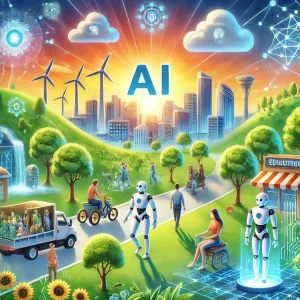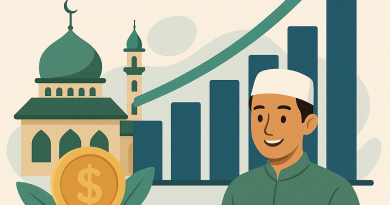Utilizing AI Wisely

By Dr. Abdul Wadud Nafis, LC., MEI
In this era of digital revolution, artificial intelligence (AI) is no longer just a technology of the future but has become a part of our daily lives. From online shopping recommendations to medical diagnoses, AI promises significant changes in how we work, learn, and even live. However, behind these promises, a fundamental question arises: Are we using AI wisely, or are we becoming its slaves?
AI has the potential to be an empowering tool for humans, solving global problems, and driving innovation. However, if misused, AI can also pose a threat: it can reinforce inequalities, threaten privacy, and even replace humans in various sectors. Thus, the big bet is in our hands: Are we leading technology, or are we letting technology lead us?
In this journey, understanding how to use AI wisely is key. It’s not only about ensuring that AI works for our benefit, but also about maintaining ethical values, security, and sustainability. Let’s delve into how we can use this technology as a tool for liberation, not domination.
1. Improving Quality of Life
AI can be used to reduce human workload through automation. For example, chatbots can handle customer inquiries quickly, allowing human time to be allocated for more strategic tasks. In the healthcare sector, AI can assist doctors in diagnosing diseases through faster and more accurate analysis of medical data.
2. Ethics in AI Use
AI must be designed and used ethically. For example, the data used to train AI systems should be examined to ensure it does not contain biases that could lead to discrimination. Additionally, transparency is essential so users understand how AI makes decisions, such as in credit applications or workforce recruitment.
3. Data Security and Privacy
Since AI works with big data, data security is a top priority. Users’ personal data must be protected from leaks or misuse. For instance, AI-based applications processing health or financial data must comply with regulations like GDPR in Europe or other privacy laws.
4. Enhancing Human Abilities
AI is a tool that can help humans learn and grow. For example, AI-based learning apps like Duolingo help users learn new languages more efficiently. However, humans must remain the primary decision-makers, with AI serving as a support.
5. Managing AI Risks
AI is not free from risks, such as data bias or the potential replacement of human labor. Therefore, regular evaluations of AI outcomes are essential. If automation threatens certain jobs, governments and organizations can help workers adapt through skills training.
6. Promoting Social Benefits
AI can be used to solve social problems, such as improving access to education in remote areas through online learning apps. Additionally, AI can support global research, for example, in addressing climate change by predicting weather patterns.
7. Technological Sustainability
AI requires significant energy, so it is important to optimize its use to be environmentally friendly. For example, using AI for energy efficiency in building management can reduce the carbon footprint.
8. Awareness and Education
Society needs to be educated about the basics of AI to avoid misconceptions. For example, educating the public about AI’s potential and limitations will help them use it wisely and avoid falling into myths or unfounded fears.
9. Multidisciplinary Collaboration
Optimal use of AI requires cross-disciplinary collaboration, such as in technology, psychology, law, and sociology. For example, the development of autonomous vehicles requires collaboration between engineers, ethicists, and regulators to ensure safety and public acceptance.
10. Preparing for the Future
AI technology continues to evolve, so individuals and organizations must always be ready to adapt. For example, business owners must understand the latest AI trends to enhance competitiveness. However, it is still important to maintain a balance between human roles in decision-making, especially in areas that significantly impact human life, such as healthcare and law.
By understanding these points, AI can become a tool that strengthens human capacity, upholds ethics, and provides sustainable benefits for the collective life.
Conclusion
AI is an extraordinary tool that can change the world, but we are the ones who determine its direction. By using it wisely, AI can become a partner in building a brighter, fairer, and more sustainable future. Let’s make this technology not only smart but also ethical and meaningful for our lives. The choice is in our hands: technology leaders or aimless followers?
References
1. Brynjolfsson, E., & McAfee, A. (2017). Machine, Platform, Crowd: Harnessing Our Digital Future. W. W. Norton & Company.
2. Tegmark, M. (2017). Life 3.0: Being Human in the Age of Artificial Intelligence. Knopf.
3. Russell, S., & Norvig, P. (2020). Artificial Intelligence: A Modern Approach (4th ed.). Pearson.
4. Floridi, L. (2014). The Ethics of Information. Oxford University Press.
5. O’Neil, C. (2016). Weapons of Math Destruction: How Big Data Increases Inequality and Threatens Democracy. Crown Publishing Group.
6. Smith, B., & Shum, H. (2021). The Future Computed: Artificial Intelligence and Its Role in Society. Microsoft Press.
7. Goodfellow, I., Bengio, Y., & Courville, A. (2016). Deep Learning. MIT Press.
8. Schwab, K. (2016). The Fourth Industrial Revolution. Crown Business.
9. European Commission. (2020). Ethics Guidelines for Trustworthy AI. European Union.
10. Moor, J. H. (2006). “The Dartmouth College Artificial Intelligence Conference: The Next Fifty Years.” AI Magazine, 27(4), 87–91.


